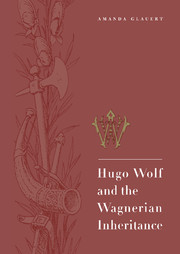Book contents
- Frontmatter
- Contents
- Acknowledgements
- Introduction
- 1 ‘Music of the future’? The nature of the Wagnerian inheritance
- 2 ‘Wagner of the Lied’? Wolf as critic of Wagner and Wagnerism
- 3 Small things can also enchant us – Wolf's challenge to nineteenth-century views of song
- 4 ‘Poetry the man, music the woman’? Wolf's reworking in his Mörike songs of Wagner's aesthetics of words and music
- 5 The integrity of musical language – questions of form and meaning in Wolf's Goethe songs
- 6 The Wolfian perspective – comparisons with the songs of Strauss and Mahler
- Notes
- Bibliography
- Index
2 - ‘Wagner of the Lied’? Wolf as critic of Wagner and Wagnerism
Published online by Cambridge University Press: 31 October 2009
- Frontmatter
- Contents
- Acknowledgements
- Introduction
- 1 ‘Music of the future’? The nature of the Wagnerian inheritance
- 2 ‘Wagner of the Lied’? Wolf as critic of Wagner and Wagnerism
- 3 Small things can also enchant us – Wolf's challenge to nineteenth-century views of song
- 4 ‘Poetry the man, music the woman’? Wolf's reworking in his Mörike songs of Wagner's aesthetics of words and music
- 5 The integrity of musical language – questions of form and meaning in Wolf's Goethe songs
- 6 The Wolfian perspective – comparisons with the songs of Strauss and Mahler
- Notes
- Bibliography
- Index
Summary
When Wolf first made his impact as a writer on circles in Vienna in the 1880s it was as an eccentric music critic for the Sunday newspaper Wiener Salonblatt. It was not exactly the impact he would have wished for; Brahms recounts how he would wait for each issue of the paper with relish to see what lunacies the young man would come up with next. Wolf's overly enthusiastic forays into the war of words between Brahms and Wagner supporters seemed ridiculous, particularly since they appeared in the pages of a journal for titbits and trivia. But Wolf's eyes were on a larger cause than the sale of popular newspapers – he was seeking to serve the cause of Wagnerism and Hugo Wolf. The two had become closely associated in his mind during his first years in Vienna a decade earlier, his need for self-promotion fanning his early Wagnerian enthusiasm into something bordering on fanaticism. When Wagner visited Vienna in 1875, Wolf ran after his coach wherever it went and stood in the lobby of Wagner's hotel until he was allowed to show the master some of his compositions.
Wolf's initial Wagnerian enthusiasm was the more remarkable since he then knew little of the music dramas themselves. As Wolf himself said: ‘I conceived an irresistible inclination towards Richard Wagner, without having yet formed any conception of his music.’
- Type
- Chapter
- Information
- Hugo Wolf and the Wagnerian Inheritance , pp. 15 - 31Publisher: Cambridge University PressPrint publication year: 1999



